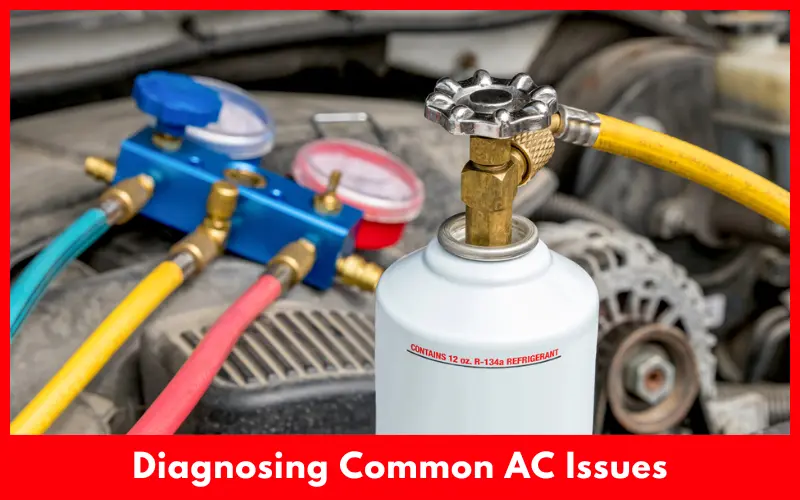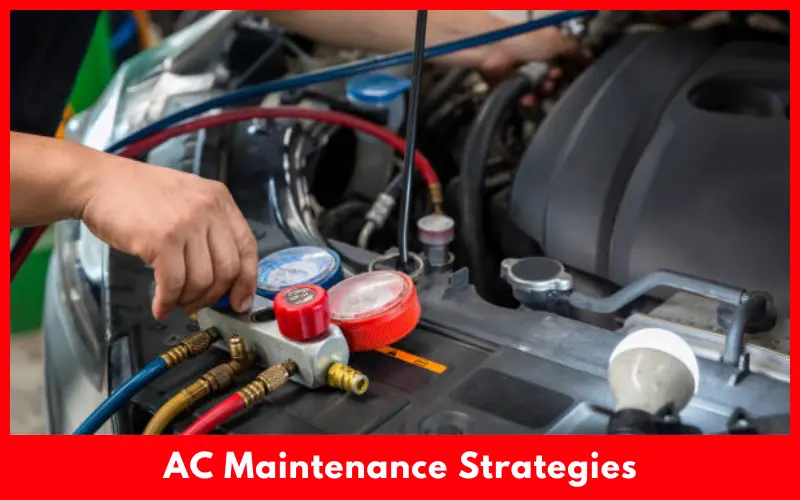Today, we’ll dive into the fleet cars AC maintenance. The element of proper fleet vehicle maintenance of air conditioning systems.
As any fleet manager can attest, up-keeping your fleet vehicles’ air conditioning (AC) systems is about much more than providing a comfortable ride for your drivers.
In fact, it’s also about a matter of safety and efficiency, which is why we’ve prepared essential tactics for proper fleet AC upkeep.
Article Summary
The Importance of Cars AC Maintenance
Before we get into the details on how to do them, let’s talk about why the maintenance of your AC is so important. First off, these fleet vehicles are subject to exposures to all kinds of weather, and a car AC compressor on and off won’t make your drivers very happy.
It can also lead to driver distraction and, by extension, accidents. Preventing AC breakdowns can lead to greater fuel efficiency and longer lives for your fleet vehicles.
Routine Inspections and Servicing
AC survival relies on regular maintenance. That starts with inspections. Schedule regular checkups to keep all the components of a new AC system to working order.
Check for the general problems of a traditional AC system, such as leakage of the refrigerant, worn belts, and clogged filters.
Clean or replace filters on a schedule, and check the compressor often as that is usually the first component to show wear and tear.
Benefits of Regular Maintenance
You can ensure that they are ready to battle the heat with fully functioning AC systems by keeping your fleet vehicles in top condition. If your fleet vehicles are kept in good working condition you have a vehicle fleet with fighting spirit against the heat with full function AC systems, this create an opportunity of drivers commuting in comfort which alleviate concentration and improves safety on the road.
This also means your fleet vehicles “AC” systems are fully efficient which in turn makes your vehicle “FE” higher a better gas mileage and their overall lifespan of the vehicles.
Addressing Refrigerant Levels
Be sure to check refrigerant levels. Refrigerant flowing through your compressor needs to be at the right pressure, or your compressor will be in danger of burning out, which will require an expensive repair.
Use a refrigerant gauge, which can be bought for about $20, to check the refrigerant levels. They should be within the minimum and maximum levels recommended by the auto manufacturer. If your refrigerant level is low, look for leaks.
Make sure the refrigerant lines are properly insulated to prevent leaks. If there are no leaks, add a small amount of refrigerant, but take care to read the instructions carefully. Your car will often use a different type of refrigerant from your home.
Understanding Your AC System
Before you learn how to maintain your own fleet’s AC systems, it is important to know a little about how an AC system works. Bowen Technologies reminds us that ‘the basic components of an AC system are the compressor, the condenser, and the evaporator.
There are also specific valves and hoses unique to an AC system’. Seeing the components of an Air Conditioning system can help you – and your technician – diagnose and solve problems before they get worse.
Cleaning the Condenser
It is normally mounted in front of the vehicle where leaves, insects, dust and dirt can easily trap into the condenser and block its heating and cooling efficiency. This will cause your AC to heat up and eventually shut down.
Cleaning it a couple times a year by running a hose and a light-bristled brush through it is recommended to keep yourself cool in the upcoming summer.
Diagnosing Common AC Issues
Once all that preventative maintenance is in place, problems can still occur. Weak airflow may be the result of a blocked filter, or a problem with the blower motor; strange noises generally mean there’s a problem with the compressor or the belts, and strange odours can be the result of mold or mildew in the ductwork.

Being familiar with all these symptoms can help you speed up the diagnosing process and keep downtime to a minimum.
Investing in Quality Parts
Quality parts play an important role in fleet vehicle maintenance, especially for AC systems. It makes sense to spend money on top quality compressors, hoses, and other parts for that system, as it will help the unit run better over time, and reduce the need for higher repair and replacement costs.
Quality parts from the beginning are often more durable and efficient, meaning that they will perform much better and are less likely to break unexpectedly.
Training Your Drivers
Fleet vehicles will only go the extra mile if the drivers responsible for them are trained to recognise early signs of AC issues and are familiar with basic troubleshooting methods, and if they also report AC problems immediately when they are first observed.
In addition, periodical training sessions on these matters can help align everyone on the straight path to a long-lived fleet.
Leveraging Technology
Today’s digital technologies can provide other advantages for managing fleets and maintaining ACs. Alongside regular maintenance schedules, technology including fleet management software can support your solutions by timely tracking of maintenance schedules and parts inventories.
Analytics received from these platforms can warn about and even predict maintenance issues ahead of time.
Deploying this kind of technology can improve the efficiency of your currently employed maintenance routines, managing to avoid any vehicle slipping through the cracks as well as assuring proper operation of each and every AC.
Such a comprehensive approach will keep you a step ahead in anticipating maintenance needs and managing your vehicle operations.
Partnering with Professional Services
Every now and then, regular scheduled maintenance tasks can be left to your personnel, but we also suggest having a partnership with f-gas certified professional HVAC service providers who can help you take it to the next level.
These technicians can provide additional security measures with their own set of specialised tools that can do more thorough inspections, run tests that are out of reach with regular instruments, and complex repairs.
With regular professional checks, your in-house work would have a solid plan to cover every aspect of your AC systems care.
Conclusion
Fleet vehicle AC maintenance involves more than just comfort, of course. When the AC is operating at its best, your vehicles are safer, more efficient, and longer lasting. So, take some time to learn more about the inner workings of the AC system, perform regular inspections, maintain proper refrigerant levels, and ensure that your drivers know how to operate the units properly.
With the help of our trusted fleet service company London vehicle leasing, you can drive cool and safely.

